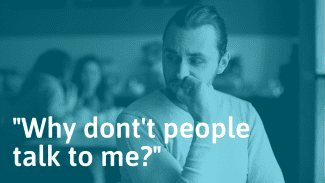Do you worry that other people don’t like you very much? For example, maybe you’re wondering whether new acquaintances enjoy talking to you, or perhaps you have a hunch that one of your friends doesn’t really want you around. The good news is that, with practice, you can get better at figuring out how others feel in social situations. In this guide, you’ll learn how to spot the signs that people don’t like you.
Sections
Signs that people don’t like you
In this section, we’ll look at some of the most common signs that people don’t like you. They apply to most social situations.
It’s best to think of the following list as a general guide. If you pick up on these signs, don’t be too quick to assume that someone doesn’t like you. There might be other reasons for their behavior. For example, they might be too self-conscious or shy to engage with you or make friendly conversation.
It’s also important to remember that low self-esteem or social anxiety can make us feel like people don’t like us even when they do. Compare how they act toward you with how they act toward others. Only assume that someone might not like you if they often or always treat you differently.
Here are some signs that someone doesn’t like you:
Their smile is fake
If someone doesn’t like you, they might try to hide their feelings with a forced smile.
Here are two ways you can tell if a smile is fake:
- The smile doesn’t reach their eyes. A genuine smile causes the muscles around the eyes to contract, which causes the skin around the eyes to crinkle slightly.
- You can see their bottom teeth. A genuine smile might reveal a person’s top row of teeth, but if you can see the bottom row, the smile is probably fake and forced.[1]
They make too much or too little eye contact
If someone keeps looking down or looking away when you speak, they may not feel comfortable speaking or listening to you.
Alternatively, it may be that you’re making too much eye contact, and it’s making them feel uneasy. Nobody wants to feel like someone is watching their every move. If you aren’t sure whether you’re making too much or too little eye contact, see our guide on eye contact.
On the other hand, too much eye contact can also be a sign that someone doesn’t feel comfortable around you. Most people understand that a lack of eye contact could be considered rude. If someone doesn’t like you, they might overcompensate by staring too much.
They point their feet away from you
Feet often show the direction where someone wants to go. If they’re interested in you, they will point their feet toward you. If not, they might be pointing away, usually towards the exit or towards someone else.[2]
Understanding body language can help you understand if people enjoy being around you. If you find it hard to pick up on nonverbal cues, see our guide on the best body language books.
Their body language doesn’t mirror yours
When two people like each other and feel a rapport, they often mirror each other’s body language.[5] For example, they might both sit leaning forward with one elbow on the table, tilt their heads at a similar angle, or use similar gestures.
Discreetly watch the other person’s posture, gestures, and facial expressions for a few minutes. If the two of you are completely out of sync, they may not like you.
They give short answers
If someone likes you, they’ll probably engage in conversation by listening carefully to what you say and giving meaningful answers. But if someone doesn’t like you (and they don’t want to avoid you outright), they’ll take shortcuts whenever possible. They might respond to your questions with brief responses like “yes,” “no,” “OK,” or “Sure.” Over text, they might react with generic emojis.
Of course, one-word answers don’t always mean someone doesn’t want to be around you. For example, they might struggle with social anxiety. Or perhaps you might not know how to ask thoughtful questions. If you suspect that you have this problem, check out our guide for more on keeping the conversation going.
They talk only about themselves
Some people are naturally self-absorbed. But when someone is interested in you, they generally ask questions about you and your life. For example, if you ask them about their job, they’ll also ask what you do for a living. If someone doesn’t like you, they may hog your attention by talking about themselves.
You might like these tips to deal with friends that only talk about themselves.
They keep checking the time
Many people have busy schedules, so if they are keeping a close eye on the time, don’t be too quick to assume they’d rather not hang out with you. But if someone keeps checking the time or glancing at their phone, it could also be a sign that they’re bored or antsy and want to leave.
Signs your friends don’t like you
Sometimes, friends will be direct and honest if they don’t want to spend time with you. But in most cases, the signs will be more subtle. Here are some things to watch out for if you suspect that your friends don’t like you.
They don’t initiate contact
If someone doesn’t like your company, they will naturally make less of an effort to stay in touch. Instead, you’ll often find yourself calling, texting, or making plans first.
If you think you’re in this situation, read more in our article on one-sided friendships.
The conversation is superficial
When two people like and trust each other, they usually share their thoughts, feelings, and experiences. If your friends seem to hold back and stick to shallow topics, they might not like you enough to open up.
For example, they might talk about their holiday plans or which movies they’d like to see, but change the subject when you ask them about more personal things like why they chose to move house or whether they’re happy in their job.
They claim to be too busy to hang out
Most people have to juggle lots of obligations, such as raising children, studying, and spending time with their partners. As we get older, friendships may fall by the wayside.
But if a friend often or always makes excuses as to why they can’t spend time together, this could be a sign they don’t like you very much. It’s even more of a red flag if you know they’re hanging out with other friends. If that’s the case, it likely means they have prioritized those relationships over yours.
Check this article on how to deal with busy friends.
They bail on you frequently
Consistent flakiness could mean that your friend isn’t great at managing their time, but it can also mean they don’t really value your relationship. Your friend may have initially made plans with you, but something “better” came up, and they decided to pursue that opportunity instead.
They often interrupt you
A friend who interrupts you all the time probably isn’t interested in hearing what you have to say. When you talk, instead of paying attention to you, they’re thinking about themselves.[3]
But keep in mind this doesn’t necessarily mean they don’t like you. Constant interrupting could also mean they are anxious or just generally a bad listener. But if you’ve noticed that they don’t do it when other people talk, it might be more personal.
If they interrupt everybody, you might consider getting some tips on how to stop someone from interrupting you.
They avoid all physical contact with you
Some people avoid hugs or other forms of physical contact, even with close friends. However, if a friend is physically affectionate toward other people but not you, it may be that they don’t like you very much.
They make fun of you
It’s normal for friends to joke around and tease each other from time to time. But if the jokes are over-the-top, it could indicate that someone doesn’t like you. Instead of telling you what they really feel, they’re using cruel humor to put you down.
A good friend will apologize if you tell them that their joke hurt your feelings. Someone who doesn’t like you or care about your feelings will often react with a defensive line like, “It was just a joke! Don’t be so sensitive!”
You can learn from these examples how to deal with people who make fun of you.
They give you backhanded compliments
Backhanded compliments are insults mixed with, or disguised as, praise. When someone gives you a backhanded compliment, they are indirectly putting you down and making it clear that they don’t respect you.
For example, let’s say someone tells you, “I’m so impressed by your cooking. I could never manage to work in a tiny kitchen like yours!” The first part of this compliment is straightforward praise. But the second part is a dig at the size of your kitchen. A real friend won’t make these kinds of remarks.
They pressure you into doing things you don’t want to do
Real friends will respect your morals and values. If a friend keeps pressuring you into doing something you don’t want to do, such as drinking or smoking, it might be because:
- They feel guilty about the behavior and want you to participate to justify their actions.
- They want to sabotage your success.
- They don’t want to participate in the behavior alone.
- They think they know what’s best for you.
Whatever the reason, the bottom line is this: someone who truly values you will respect your boundaries. Check this article on setting boundaries with your friends.
They only talk to you when you’re in a group
If someone doesn’t like you, they may be friendly when you’re both hanging out in a group but ignore you in private. In front of others, they may include you because they don’t want to hurt your feelings or because they want to appear polite. But if there’s no one else around, they might feel they can get away with ignoring you.
They ghost you
A friend may ghost you if they don’t like you and no longer want to keep communicating but don’t want to tell you the reason why. Unfortunately, ghosting has become more and more common.[4]
Here are some telltale signs a friend is ghosting you (or about to ghost you):
- They stop contacting you as much.
- When you text, they respond with one-word answers.
- They don’t show any interest when you talk about making future plans. Instead, they might give a vague answer like “We’ll see” or “Let me think about it.”
- They seem to always be on their phone, but they rarely text or call you.
- The friend stops responding to all your messages.
They give generic gifts
A friend who likes you will try to choose gifts that suit your taste and personality. They may not get it right every time, but you’ll probably get the feeling that they at least made an attempt to find something that will make you happy.
If someone doesn’t like you but still feels obligated to give you a gift—for example, if you gave them a birthday gift and they want to give one in return—they may pick out something bland that requires no thought or effort.
This isn’t an ironclad rule because some people are just bad at choosing gifts. But if you have a friend who gives everyone else thoughtful gifts, generic presents can be a red flag.
They laugh at or trivialize your misfortune
A friend who likes and cares about you will sympathize when you have a problem or experience something difficult or traumatic. They will listen, try to understand what you are going through, and help you to find solutions. However, someone who doesn’t like you might laugh instead or insist that you find the funny side.
For example, let’s say you have a terrible week: your partner breaks up with you, you sprain your ankle, and you lose your job.
A real friend would make supportive comments such as “If you want to talk, I’m here” or “Things are really tough for you right now, I’m sorry.” But someone who doesn’t like you might make flippant, unhelpful comments like “Wow, the universe really hates you, huh?” or “Huh, I wonder what’s going to happen next?”
They gossip about you
True friends don’t gossip about each other. Someone who likes you will not speak badly of you behind your back or talk about your private affairs with other people. If they do accidentally pass on something you’d prefer to keep quiet, a real friend will apologize.
You might like this article on how to deal with different types of toxic friendships.
Signs that your coworkers don’t like you
Getting along with colleagues is undoubtedly important for enjoying and succeeding in your job. But it can be challenging to tell if people like you at work. Here are some clues that suggest your coworkers don’t like you.
They stop talking when you walk into the room
Have you ever walked into a meeting or the break room and felt the energy shift? The room fell quiet, people looked down at their feet or exchanged glances at one another, and things felt awkward? If so, it could mean they were just talking about you, or they were talking about something they don’t want to share with you.
They are extremely polite to you
With time, most coworkers tend to relax around one another. They might complain about work, make jokes, or try to get to know you on a personal level.
But if someone doesn’t like you, they may react by acting extremely polite. Usually, this behavior comes from a place of guilt or fear. They don’t want you to know their true feelings, and so they overcompensate with politeness.
For example, they might make a point of using formal language (e.g., a stiff “Good morning” rather than “Hi!”) or be overly apologetic (e.g., making a big deal of saying “Sorry” if they bump into you).
They compete with you
Depending on the workplace, it’s normal for some level of competition to exist among coworkers. Most people want to succeed, and you’re usually competing for the same promotions.
But if everything seems like a contest, tournament, or bet with someone, pay attention. This pattern could be a sign that they value outperforming you over building a respectful working relationship.
For example, a very competitive colleague might keep asking you exactly how many sales you’ve made recently—even if it makes you visibly annoyed—because they want to compare their performance against yours.
They downplay your accomplishments
Most people know that it’s bad manners to downplay their coworkers’ accomplishments. If your colleague minimizes or ignores your achievements, such as an award, promotion, or qualification, they probably don’t like you enough to bother following this basic social rule.
For example, they might say things like, “Oh yeah, I heard that you won Employee Of The Month. I guess it was your turn to get it,” rather than “Congratulations on winning Employee Of The Month!”
They act like they’re your boss (when they aren’t)
If a coworker doesn’t like you, they may boss you around or demean you. Their behavior sends the strong message that you are inferior to them. They may give you orders or push extra work onto you.
They might also scrutinize your mistakes and run to your boss to try to get you into trouble. Any of these signs strongly indicate that they probably don’t respect you.
They always turn down your ideas
It’s normal to disagree in some work environments. But if a coworker always turns down your suggestions, they might not like or respect you. They might laugh or make mean comments like, “Why would you even suggest that?” or “You have got to be kidding, that’s ridiculous.”
They keep encouraging you to quit your job
A toxic coworker may subtly or directly encourage you to quit so that they don’t have to work with you. They might make comments like:
- You deserve so much better than this job!
- Wow, you’ve been working here for a really long time. When are you planning on leaving?
- You’d love working for ____!
Of course, some well-meaning coworkers might also encourage you to quit your job if you’re unhappy at work. The difference is that these people will usually do so after you’ve told them about an exciting opportunity. Toxic coworkers will make these kinds of statements for no obvious reason.
You might also investigate further down if you find yourself with no friends at work.
Signs that your partner doesn’t like you
Most of the signs in previous sections also apply to romantic partners. But there are some extra signs you can watch out for if you’re trying to decide whether the person you’re dating really likes you.
We also have two comprehensive guides on how to know if a guy likes you and how to know if a girl likes you that can help you figure out whether someone has a crush on you.
They don’t introduce you to their family or friends
When someone feels excited about your long-term potential, they want to introduce you to their loved ones. If a few months have gone by and you haven’t met any of their friends or family, it could mean they don’t see you two having a future.
A reluctance to meet your friends and family is also a red flag. When someone likes you and wants to build a meaningful relationship, they will probably want to meet the people who are important to you.
They don’t make time with you a priority
If your partner is serious about you, spending time together will be one of their top priorities. That doesn’t mean they won’t spend time with their friends or family. However, if they often prefer to hang out with other people instead of you, they might not be invested in your relationship.
They avoid intimacy
Every relationship is unique when it comes to sex and intimacy. It’s normal to have some fluctuations, especially during stressful times. But if things have changed abruptly and they act in a defensive way when you try to talk about it, it could mean they’re losing interest or withdrawing from you.
They only want sex
Although a dropoff in intimacy can be a red flag, you should be wary if someone only wants to hook up with you. Healthy relationships are so much more than sex. Ideally, you two should also be connecting through conversation, going on dates, spending time with loved ones, and just hanging out together.
They change the subject when you talk about the future
When someone is serious about a relationship, they talk about things like moving in together, marriage, and having children. Even if you’ve only been together for a few months, it’s normal to talk about future plans like vacations or holiday celebrations. If your partner changes the subject or looks uncomfortable whenever you bring these topics up, it could be a red flag that they aren’t planning to be with you for much longer.
They often criticize you
If your partner often puts you down, they probably don’t value or care about you. They might criticize anything and everything, such as the way you dress, the kind of work you do, or your hobbies.
Criticisms can be direct and blunt. For example, your partner might say something like, “Why do you wear such bright clothes? They look so childish.”
But criticisms and putdowns can also be more subtle. For example, your partner might make a suggestion that sounds sensible but also implies that you need to change something about yourself. They might say something like, “You should work out more often. It’s good for you, and you’ll look better.”
Frequent criticism can be a sign of abuse. For more advice on healthy relationships and how to spot abuse, we recommend this extensive guide by Love Is Respect.









im annoying, and no one likes me. 🙁 been alone for years.
i hate how people make fun of quiet kids
my partner , constantly talks about herself! and when i speak , she says I’m always interrupting her, and when she starts a conversation when I’m quite! , then when i start to talk! , she shuts me down! , in different ways, when she i talking to anyone about herself ! , which is all the time! , if i speak or make any conversation! at all , she later tells me I’m rude ! , and i have to always try to make the conversation about me ! , and I’m being rude and it’s inappropriate ! to interrupt ! some when they are have a conversation! , i fist thought ! , and have actually ! stated to her that it’s probably best i just don’t speak unless ! spoken to , or even not at all ! , but now! it’s so bad that i feel like she just needs a ventriloquist ! dummy! , that only speaks ! when she wants me to! , but when i do speak! it must only be what she wants to hear! otherwise i get enialated! for getting it wrong!? , can anyone please!!! help!?
I just need help to see if the person I like likes me back .